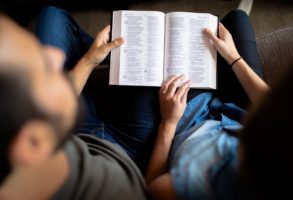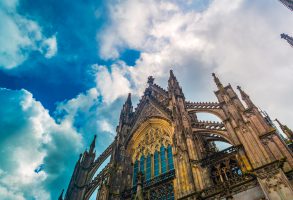Published April 15, 2008
Il Foglio
What do Americans expect from the Pope’s visit?
I think the country as a whole expects to meet a wide religious and moral leader, who shares the historic American commitment to promote and defend religious freedom around the world. I think the Church in the United States, which is the most vital and vibrant local church in the developed world, is expecting words of encouragement from its chief shepherd.
What is your own judgement about Ratizinger’s strengths today?
He has a clear view of one of the great problems of world culture today: the separation of faith and reason. I expect this theme will recur throughout his time in the U.S.: the moral truths we can know by reason are an essential “grammar” by which the world can translate noise into conversation.
You wrote about the Grand Strategy of Benedict XVI. Could you explain to our readers what is it, in terms of re-evangelization, compared to Jonh Paul II, and how will it be perceived?
When I wrote in “Newsweek” of the Grand Strategy of Benedict XVI, I meant his efforts to restructure interreligious dialogue, especially with Islam, by focusing on the two key issues: religious freedom and the separation of religious and political authority in the state. Of course that Grand Strategy with regard to Islam requires a Catholicism that knows its own faith and can explain it in a rational and compelling way. So Benedict XVI’s “back to basics” approach to the new evangelization fits neatly with his bold new approach to interreligious dialogue.
Re-shaping the dialogue between Catholics and Islam: what is your judgement on this issue? Will he succed? Will he need to convert western ways of thinking to succeed?
He certainly has to convince the West — or at least the part of the West that is Europe — that religious conviction can play a positive role in public life. As for Islam, the pope is thinking in terms of change that will take decades, even centuries, to achieve. But you have to start somewhere, and he believes that “somewhere” is here-and-now.
Could you explain to what extent you think his influence will be more effective in America than in Europe, and if so, why?
Benedict XVI is likely to be more influential in America now because America is not a post-Christian society, as Europe is. So Benedict speaks a language that Americans can understand, whereas to much of European high culture he is, at best, an interesting anachronism.
Religion is a fundamental element in American democracy. If you are American, you can be a believer, without being accused of bigotry, since religion belongs to individual freedom. Could you explain to us the impact of Catholic doctrine, and of its concept of truth, on the American mind, and particularly the effectiveness of the pope’s war against modern relativism?
Freedom in its modern political form came to Europe as a project against Christianity, and specifically against the Catholic Church, which was understood as an institutional supporter of the old regimes. Freedom in its modern political form came to America as a product of the encounter between Christian conviction and Enlightenment political thought. So that’s a big difference: democracy has never been understod in America as something antithetical to Chrisdianity. And while American high culture, like European high culture, plays in the sandbox of postmodernism and relativism, the American people as a whole are what we might call more epistemologically robust: they know that there are truths built into the world and into us, and they know that those truths should shape public life. The first stanza of the American national anthem ends with a question — does the flag of the American republic still wave “o’er the land of the free and the home of the brave?” Answering that question positively requires a noble concept of freedom and a robust sense of moral duty in every generation. You don’t get either one of those things by playing like children in the postmodern sandbox.
George Weigel is Distinguished Senior Fellow of the Ethics and Public Policy Center in Washington, D.C. and holds EPPC’s William E. Simon Chair in Catholic Studies.






